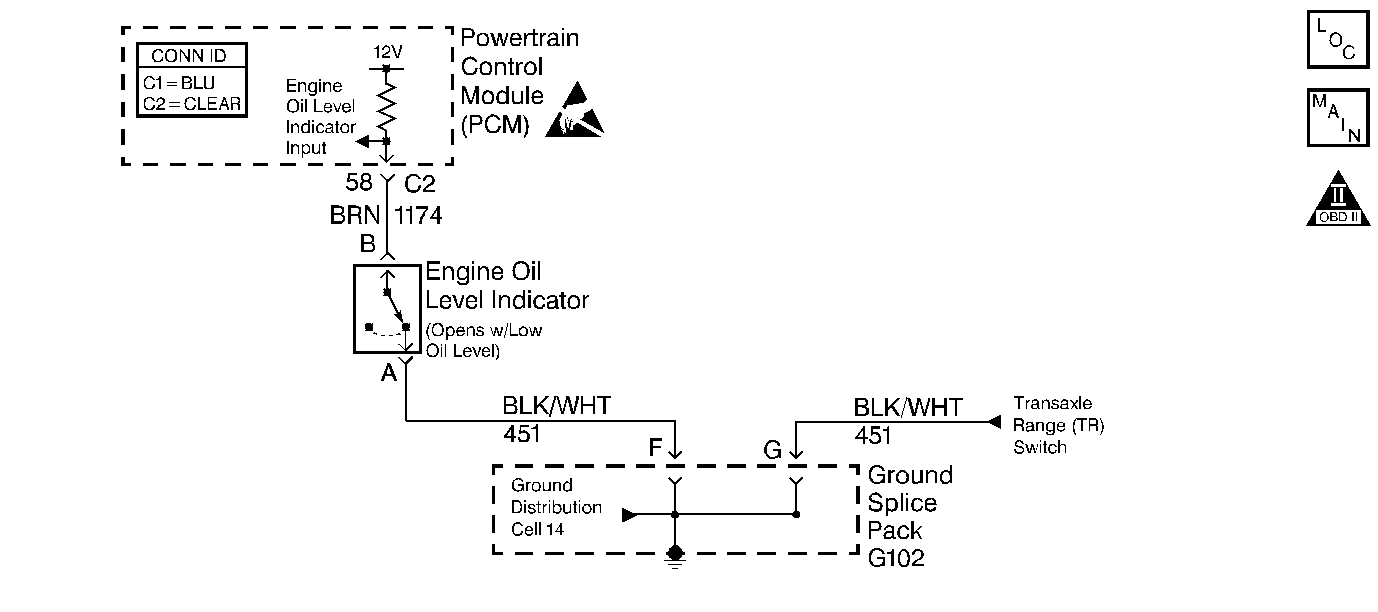
Circuit Description
The Engine Oil Level Switch is a simple float switch that is grounded when the engine oil level is OK. The PCM checks the Engine Oil Level switch circuit at startup. Before checking the state of the Engine Oil Level switch, the PCM performs a test routine based on time and engine coolant temperature to ensure that the engine oil has drained back into the sump. To test for low oil level at start-up, both of the following conditions must be present:
| • | The engine coolant temperature must be greater than 15°C (59°F). |
| • | The engine coolant temperature at key ON must be at least 12°C (22°F) cooler than the engine coolant temperature at the last key OFF. |
Diagnostic Aids
For diagnosis of the instrument panel, perform the System Check in the Instrument Cluster section of Electrical Diagnosis. Refer to Diagnostic System Check - Instrument Cluster
Check for the following conditions:
| • | Poor connection at PCM or oil level sensor. Inspect harness connectors for backed out terminals, improper mating, broken locks, improperly formed or damaged terminals, and poor terminal to wire connection. Refer to Wiring Repairs |
| • | Damaged harness. Inspect the wiring harness for damage. If the harness appears to be OK, disconnect the PCM and turn the ignition ON. Observe a voltmeter connected to the affected PCM output circuit while moving connectors and wiring harnesses related to the PCM output circuit. A change in voltage will indicate the location of the fault. |
Test Description
Number(s) below refer to the step number(s) on the Diagnostic Chart:
-
This vehicle is equipped with a PCM which utilizes an Electrically Erasable Programmable Read Only Memory (EEPROM). When the PCM is being replaced, the new PCM must be programmed.
-
For the PCM to check engine oil level, start-up engine coolant temperature must be at least 12° C (22° F) cooler than the engine coolant temperature was last time the ignition was turned OFF. Allowing the engine to warm and then cool ensures that the PCM checks the engine oil level switch and that the information displayed on the scan tool is current.
Step | Action | Value(s) | Yes | No |
|---|---|---|---|---|
1 |
Important: : Ensure that engine oil level is not low (as indicated on dipstick) before continuing diagnosis. Was the Powertrain OBD System Check performed? | -- | ||
2 | Observe Oil Level display on the scan tool. Does Oil Level display OK? | -- | Go to Diagnostic Aids | |
3 |
Is the test lamp ON? | -- | ||
4 |
Does the DMM display voltage near the specified value? | B+ | ||
5 | Connect the DMM between the Oil Level Switch signal circuit and chassis ground. Does the DMM display a voltage near the specified value? | B+ | ||
6 |
Was a problem found? | -- | Go to Diagnostic Aids | |
7 |
Was a problem found? | -- | ||
8 |
Was a problem found? | -- | ||
9 | Locate and repair open in the Oil Level Switch ground circuit. Refer to Wiring Repairs . Is the action complete? | -- | -- | |
10 | Replace the Oil Level Switch. Refer to Engine Oil Level Indicator Switch Replacement . Is the action complete? | -- | -- | |
|
Important: Replacement PCM must be programmed. Refer to Powertrain Control Module Replacement/Programming . Replace the PCM. Is the action complete? | -- | -- | ||
12 |
Does Oil Level display OK? | -- | System OK |
